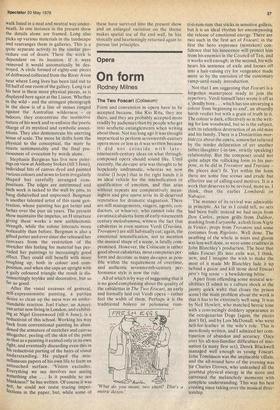Opera
On form
Rodney Milnes
The Two Foscari (Coliseum) Form and convention in opera have to be accepted because, like Rio Rita, they are there, and they are probably accepted more readily by audiences than by people who get into aesthetic entanglements when writing
about them. Not too long ago it was thought impractical to perform seventeenth-century opera more or less as it was written because it did not coincide with latenineteenth-century ideas on what throughcomposed opera should sound like. Until recently, the da-capo aria was thought to be hopelessly undramatic, whereas we now realise (I hope) that in the right hands it is an ideal vehicle for the intensification or qualification of emotion, and that arias without repeats are comparatively meaningless and give opera seria its ill-deserved reputation for dramatic stagnation. There are still managements, singers, agents, conductors, or whoever, who cannot take the cavatina/cabaletta form of early-nineteenth century melodramma, witness the fact that cabalettas in even mature Verdi (Traviata, Trovatore) are still habitually cut; again, the emotional intensification, not to mention the musical shape of a scene, is fatally compromised. However, the Coliseum is rather good about cabalettas, most companies perform and decorate as many da-capos as possible within the requirement of overtime, and authentic seventeenth-century performance style is now the rule.
All of which is by way of suggesting that it is no good complaining about the quality of the cabalettas in The Two Foscari, an early and formally laid out Verdi opera — rather feel the width of them. Perhaps it is the traditional bolero or polonaise rum ti-ti-turn-turn that sticks in sensitive gullets, but it is an ideal rhythm for encompassing the release of emotional energy. There are two such in the first act of Foscari; in the first the hero expresses (mistaken) confidence that his innocence will protect him from his enemies in the Council of Ten, and it works well enough; in the second, his wife hears his sentence of exile and looses off into a hair-raising cry for vengeance made more so by the omission of the customary vamp-until-ready introduction.
Not that I am suggesting that Foscari is a forgotten masterpiece ready to join the repertory. Verdi himself later wrote it off as a 'deadly bore. . . which has too unvarying a colour from beginning to end', an absurdly harsh verdict but with a grain of truth in it. The colour is dark, effectively so in the writing for low woodwind, but so is the subject, with its relentless destruction of an old man and his family. There is a Donizettian morbidezza about the opera, somewhat relieved by the tender delineation of yet another father/daughter (-in-law, strictly speaking) relationship. But the composer could not quite adapt the rollicking form to his purpose, as he did in Trovatore and Traviata — the pieces don't fit. Yet within the form there are some fine scenas and crude but effective use of calling-card motives. It is a work that deserves to be revived, more so, I think, than the earlier Lombardi or Nabucco.
The manner of its revival was admirable in principle. As far as I could tell, no sets had been built: instead we had steps from Don Carlos, prison grills from Dalibor, masking from Euryanthe, a cloth from Night in Venice, props from Trovatore and some costumes from Rigoletto. Well done. The swathing of the whole in mists and gloom was less well done, as were some crudities in John Blatchley's production. The boat that takes Foscari fi/s into exile was, I think, new, and I imagine the wish to make the most of it made Mr Blatchley fade it up behind a gauze and kill stone dead Foscari pere's big scene — a bewildering betise.
Apart from offending some musical sensibilities (I admit to a culture shock at the jaunty quick waltz that closes the prison scene) the main problem about the work is that it has to be extremely well sung. It was by Neil Howlett, who matched heroic tone with a convincingly doddery appearance as the octogenarian Doge (again, the pieces don't fit), and by Lois McDonall, who went hell-for-leather at the wife's role. This is mercilessly written, and I admired her com bination of abandon and accuracy. Once over his all-too-familiar difficulties of intonation (a nasty first act), Derek Blackwell managed well enough as young Foscari.
John Tomlinson was the implacable villain, and the all-round hero of the evening was Sir Charles Groves, who unleashed all the youthful physical energy in the score and carressed the melancholy moments with complete understanding. This was his best evening since taking over the musical directorship.


































 Previous page
Previous page